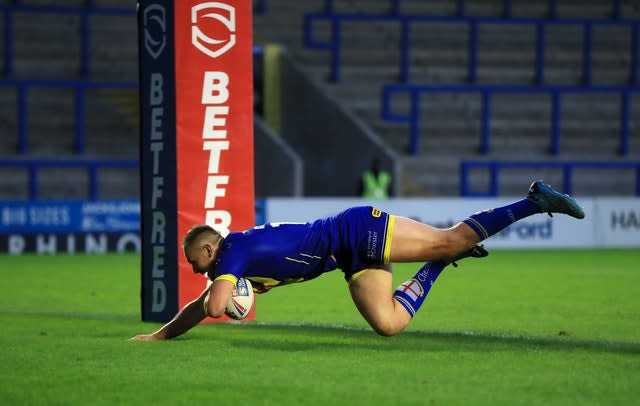RFL fears job losses ‘across the sport’ with the continuing lack of crowds
Rugby league’s governing body fears job losses “across the sport” as a result of the continuing lack of crowds.
Plans for supporters to be allowed back into sports events from October have been shelved by the Government following a tightening of public restrictions in the fight against coronavirus.
Super League, which has staged matches behind closed doors since it resumed in August, had been due to host four pilot matches with crowds of up to 1,000 on September 30 but those plans have been scrapped.
The RFL was granted a £16million Government loan earlier in the year but it has warned that short-term measure cannot guard against the consequences of further sustained disruption.
A statement from the RFL read: “The loan facility provided by Government has been welcomed by the sport. It was predicated on an initial 12-week lockdown.
“Additionally, every club has taken significant steps to reduce costs, and players and staff have taken pay reductions.
“The sport has reacted quickly and decisively in facing these challenges. Yet it remains likely that with losses at up to £2million a week across the sport as a whole, and continued uncertainty, there will be job losses across the sport.”

The potential loss of income from having to play showpiece matches such as the Challenge Cup final and Super League Grand Final behind closed doors could have a big impact on the sport. Already, strong revenue has been lost from the cancellation this autumn’s Ashes series.
Wakefield owner Michael Carter admits the financial implications are a serious worry.
“This year has never been the issue for me really,” said Carter, who is also Trinity’s chief executive.
“The decisions we took in April, May and June time with the staff cuts and furlough scheme reduced the pressures on this season.
“It was a case of building up to hopefully getting crowds back to some sort of normality for next season, so what this does do now is pile the pressure on one of the big hurdles we were coming up to which is season ticket sales.
A statement from Rugby Football League CEO Ralph Rimmer following the Secretary of State DCMS Update earlier today…https://t.co/sNVyZfO5OH pic.twitter.com/EmWWiCzzGF
— Rugby Football League (@TheRFL) September 22, 2020
“We are probably one of the lower clubs in terms of numbers and revenues that that procures but it’s still a big hole in our budget.
“We had planned to go on sale with season tickets in November but we’re going to have a rethink now.
“If you’re a fan, you’re not really going to buy into buying a season ticket when you don’t know what’s going to happen next year and I guess that could ultimately be the downfall for a number of clubs who will be relying on that income coming in from November to January.
“We have to find a way around the £250,000 we were expecting to come from season-ticket revenue if it doesn’t come in.
“And if we haven’t got crowds in February, that’s a £60,000 or £70,000-a-game loss on the back of a Sky rebate of upwards of £250,000 per club. There’s suddenly big, big holes.
“It’s a very serious speed bump. We could ultimately be faced with starting next season with no or limited crowds and, if that’s the case, then all of us are going to look at budgets again.”
Carter has confirmed that Wakefield have applied to the RFL for a share of the Government loan.
“Our application is in and I’m led to believe it has been successful,” he said. “If we do get that money, it will not be spent frivolously on wages, it will go into the rainy day fund. God knows how many rainy days we’ll have.”
The first Wigan 🆚 Saints derby of the 2020 Betfred @SuperLeague season will now take place on 𝗧𝘂𝗲𝘀𝗱𝗮𝘆 𝟮𝟵 𝗦𝗲𝗽𝘁𝗲𝗺𝗯𝗲𝗿 at Salford's 𝗔𝗝 𝗕𝗲𝗹𝗹 𝗦𝘁𝗮𝗱𝗶𝘂𝗺 with kick off at 𝟴:𝟭𝟱𝗽𝗺, live on @SkySports.
More details 👇https://t.co/VuRjrdzC9b
— St.Helens R.F.C. (@Saints1890) September 22, 2020
Super League has hastily rearranged some of its round 14 fixtures next week following the abandonment of the pilot programme.
The Wigan-St Helens derby has been brought forward from Wednesday to Tuesday and switched from the DW Stadium to Salford.
That will be one of two televised matches on Tuesday, while Leeds and Huddersfield will play at their own grounds on Wednesday and Castleford’s home game against Hull FC has been pushed back 24 hours to Thursday.

 Yahoo Sport
Yahoo Sport 





































